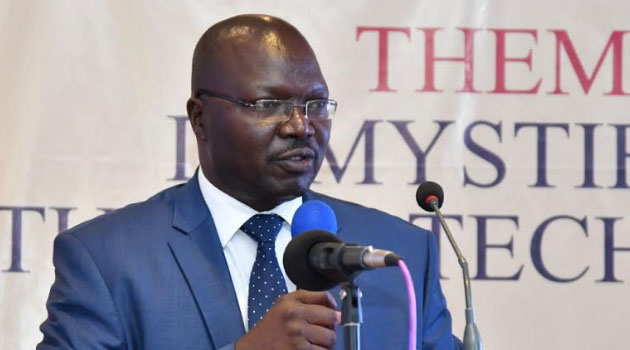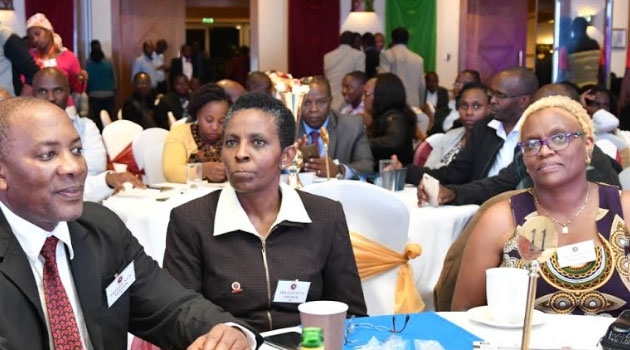NAIROBI, Kenya Aug 3 – Engineers are now urging the government to explore modern technological advancements to be able to attain global Sustainable Development Goals (SGDs) by utilizing the underground space.
At a dinner held in Nairobi last week by the Institute of Engineers of Kenya (IEK), professionals present were unanimous that times have changed and so should the way of doing things, and emphasised the need to adopt modern technology in new projects.
The engineers had met to discuss emerging trends in the industry in form of Innovations in Tunnel Design and Construction.
Water Cabinet Secretary Simon Chelugui, who graced the dinner event lauded Athi Water Works Development Agency for spearheading the formation of the Tunneling Association of Kenya whose aim is to promote use of underground space in Kenya, furtherance of education and training on underground space and improvement of tunnel safety construction and operation.

Eng Michael Thuita, the Chief Executive Officer of Athi Water Services Board during an IEK dinner in Nairobi on August 1, 2019. Photo/COURTESY.
Tunneling helps to increase sustainability in urban areas and key public resource regions through sustainable underground space use management and Tunneling while ensuring cost efficiency.
“Tunnels permit the transmission of passengers and freight and also utilities such as water, sewage and gas. When tunneling procedure is applied, there is minimal disturbance on the surface life or ground activities,” Chelugui said.
The role of tunneling and underground space in Kenya and Africa as a whole has been intensively actualized over the recent past.
“Economic and efficient transport of people, goods and services is one of the pillars in this government’s big four agenda as well as Kenya’s Vision 2030.,” Chelugui said.
Chelugui is confident that Kenya’s efforts in achieving the global Sustainable Development Goals (SDGs) can be realized with proper planning, design, and execution of development projects and more sore those that utilizes underground space.
“Although these projects are to be developed on a national scale, we want to work collaboratively with county government, communities and key stakeholders in order to achieve these goals,” he said. “This particular opportunity allows us to interact with several industry professionals and serves to further motivate those planning to develop a career in tunneling and underground space as well as geotechnical engineering.”
He said Kenya can only achieve the best results through collaboration and partnership with the engineers.
“The fundamental role you all have in working alongside the national and county government is crucial for achieving these goals of economic transformation through effective underground space use and tunneling management,” the CS said, and regretted that “It is hard to imagine a country like Kenya with the kind of topography it has; without elaborate road tunnels. And it is hard to fully acknowledge the skills, efforts and determination of the engineers and construction workers who are at our disposal.”
He also stressed the need for the development of a focused policy framework on the underground space planning, use and management.
The dinner was attended by more than 500 engineers.
The Ministry of Water and Sanitation is already undertaking various projects that involve use of tunnels in water transport such as the Northern Collector Tunnel Project, Itare Dam Project, Karimenu II Dam Project, Thwake Dam and Mwache Dam among others.
“Some of the challenges facing the sector which need to be addressed as a matter of priority include diminishing water resources, low funding, high Non-Revenue Water and governance. To attain universal access by the year 2030, the country requires to invest Sh1.754 trillion meaning every financial year the sector needs Sh100 billion of which only about Sh45billion is available largely through donor funding. The current levels of Non – Revenue Water is about 42%. The Ministry is making efforts to reduce Non-Revenue Water to acceptable levels of 20% and below by the year 2030,” he said.
Engineer Collins Gordon, the president of the Institute of Engineers of Kenya said the new approach of innovation will enable professionals provide solutions and impact the society positively.
“In our undertakings as engineers, we ought to keep abreast with the new technologies in providing our services. This will enable the profession remain relevant at all times. This will also enable the completion of projects on time and within budget which is very critical if we are to be competitive regionally and internationally,” Eng Gordon said at the dinner also attended by Water Cabinet Secretary Simon Chelugui.
Engineer Gordon, particularly cited the need for innovations in water management whose demand in the country is increasing by the day.
“The need for water is increasing day by day all over the Earth and of significance is that the fresh water and clean water resources are depleting at an alarming rate. Kenya is considered a water scarce country,” he said.
Its per capita water availability, he said, is less than 600 cubic meters, which is below the global threshold of 1000 cubic meters per capita.
The IEK boss said water scarcity is a critical constraint to the country’s socio-economic development and its achievement of Kenya’s Vision 2030 as well as the global development agenda detailed in the Sustainable Development Goals.
“The situation is exacerbated by climate change and increasing water demand due to population growth and urbanization,” he added, and emphasized the need for them as Engineers “to come up with innovative way of ensuring that this critical component of life (Water) is not under threat.”
He lauded the government for creating an enabling environment comprised of policies and legislation designed to increase access to clean water for all inadequate quantity and quality at an affordable price as envisaged in, the Big 4 Agenda, Vision 2030 and the Constitution of Kenya.
But he was particularly, concerned about the pending appointment of the Board members for Engineers Board of Kenya. I wish to assure members that the Council is aggressively pursuing the appointment of the Board.
“This will go a long way to address the low transition rate of graduate engineers to Professional Engineers,” he said.












































